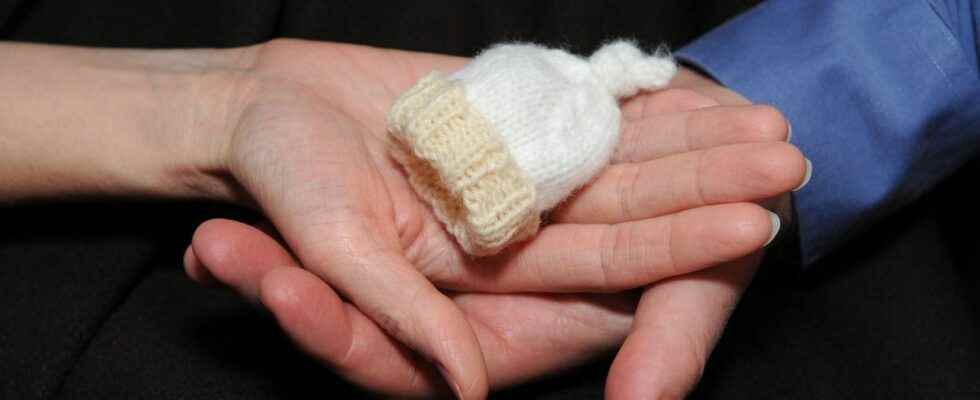Published on
Updated
Reading 2 mins.
“Make up your mind, he won’t survive.” Although perinatal bereavement, which affects a little more than 1% of pregnancies, is the subject of better care by medical teams, there is still a long way to go to better support parents in the face of trauma.
Last June, Laurie, whose first name has been changed, gives birth to a stillborn baby, after five months of pregnancy. Her gynecologist told her during a follow-up ultrasound: “Make up your mind, he won’t survive.” It was her first child, Laurie leaves the hospital traumatized…
“I stayed for more than 24 hours alongside mothers whose deliveries had been a success, when I had just lost my daughter. I had to beg a midwife, who finally agreed to change my room“, she explains.
Alice – who did not wish to give her surname – also had a very bad experience. In 2016, she discovers, at the second ultrasound, that her child has kidney malformations which will prevent him from living, and undergoes a medical termination of pregnancy (IMG).
“The doctors were very factual, the operation seemed trivial to them, as if they were doing this every day. I was not offered any long-term follow-up, and I was sent home”laments Alice.
She would like caregivers to be more trained in the management of perinatal bereavement, which still remains “far too taboo”.
“There is a real awareness among caregivers, but there is still a lot of work to do, and we must continue to raise staff awareness”recognizes Christine Krautter, former midwife and vice-president of Agapa, an association which offers “a welcome around perinatal bereavement for parents“, and also takes care of training caregivers.
Before the world day of perinatal mourning organized on Saturday, she underlines: “midwives and doctors have understood the importance of leaving a trace of the child for the parents: a photo, an imprint, a lock of hair… This was not the case before“.
Follow your pregnancy week by week
“Helping Parents”
In France, according to the latest figures from the Department of Research, Studies, Evaluation and Statistics (DREES) of the Ministry of Health, perinatal bereavement affected just over 1% of pregnancies in 2019. Reported to the overall number of births, this would represent between 7 to 8,000 women per year.
Perinatal bereavement refers, in a broad sense, to miscarriages, deaths in utero, stillborn babies, or babies who died within a few days of pregnancy.
“All the caregivers in the service are trained in perinatal bereavement”, highlights Astrid Brunswick, psychologist at the Louis-Mourier maternity hospital, in the north-west of Paris. However, she admits working in a maternity ward often faced with difficult pregnancies: “We are used to helping parents.”
The Strasbourg University Hospital has also trained its staff in perinatal bereavement, as explained by Nadine Knezovic, midwife who initiated discussion groups for bereaved parents, which take place four times a year at the hospital. “We teach the staff to announce the news to the parents, and to accompany them before, during, but also after”she says.
Loïc Bienvenaut lost his son in 2019, after his wife underwent an IMG following an amniocentesis which revealed trisomy XXI and a heart defect in their child.
“The support group at the Strasbourg University Hospital allowed us to understand that our grief was legitimate. We were both very well prepared for the IMG, and a midwife took care of us alone for a whole day. .”, he said.
Today, Loïc Bienvenaut and his companion are the parents of a two-year-old girl whom they have “presented to the entire Strasbourg University Hospital, to show our gratitude”.
